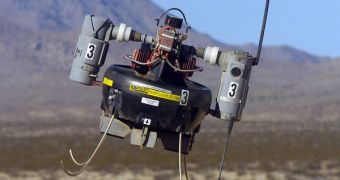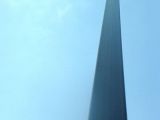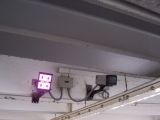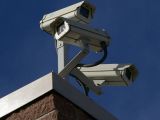With filmmaker Robert Spence's announcement that he will be using the first-ever eye-shaped video camera for his new documentary, security experts and privacy advocates are becoming increasingly concerned as to the impact that the next generation of surveillance equipment will have on the traditional way people perceive their own personal space.
Already, street-mounted cameras, most of which are visible, record, document and store everything we do on the streets, for our own security, advocates of CCTV (closed-circuit television) and other means of “civilian spying” say. But are they really used for this purpose alone? I have often wondered if the people behind the monitors checking us all out have only our best interest in mind, or if they are motivated by other agendas as well.
Such a line of reasoning is not that far-fetched, especially when you think that large corporations are already considering placing hidden cameras in street ads, which will analyze your face, determine your relative age, gender and ethnicity, and then display relevant ads on huge billboards. This type of advertising was completely unheard of until now, but it would appear that its proponents consider it the way of the future.
But, while supporters say that the images will not be stored, but discarded once people leave the range of the camera, others fear that internal memory slots could be used to take relevant information about a person's apparel and identity. Computer hackers could easily tap into this type of system, as not all of the installed ones will be surveyed non-stop. As with biometric passports, advertised as safe, but which were proven to be easily falsified, the right people, but harboring the wrong intentions, are very capable of breaching systems that have been advertised to us as impenetrable.
Take for instance the Pentagon, which boasts one of the most well-defended networks in the world. Many attacks have succeeded in breaching their countermeasures, and have created important security breaches in their mainframes. And these actions were not accomplished by some secret agency working for an enemy government, but by hackers standing alone in their rooms. I guess that what I'm trying to say is that if people create a seemingly-foolproof system, then surely other people can crack it.
Back to the issue of biometric chips and sensors, a lot of people believe that by installing them in their own bodies, or their passports and ID cards, they will remain out of harm's way. However, this couldn't be more wrong, and for two simple reasons. First of all, the data stored on those RFID devices is not safe, and can be cracked with relative ease by informatics students with the right equipment.
Secondly, and the most important reason, it's precisely terrorists, the people we're supposed to be protected from with these devices, that will attempt to hack the new system and use it to their advantage in the first place.
If you allow yourself to be implanted with a chip that tracks your location at all times, and which has all your personal data on it, then a skilled hacker can easily assume your identity for their own. Thus, in a bid to make you more secure, authorities would have provided the “enemy” with the very weapons they need to defeat the system they are so strongly fighting against.
But this is just one side to the whole surveillance/security story. Also consider some of the other threats that you will become increasingly subjected to in the near future. The streets will become more and more clogged with security cameras, belonging either to governmental agencies or security services, or to CCTV lines. Computer software, able to predict walking patterns, and also to tell average people from those behaving in a suspect manner, will scout every single step you take, from vantage points that will make it impossible for you to see them.
Mobile CCTV vans already patrol the streets, collecting random images of people, for later use, in case something happens. All protests are currently being video-tapped by police departments around the world, even those in which only less than a hundred people participate. Authorities never ask permission to collect these images, and, furthermore, do so even if the persons being surveyed ask specifically not to be filmed.
In addition, medical research will in time figure out ways of constructing nano-machines that are able to watch over your health, which is absolutely magnificent. But most of these new technologies are said to also incorporate GPS tracking devices, meant to beam back your position to a central database at all times. I guess what I'm trying to ask is why are governments worldwide so desperate to control our every action, and to always know were we are, who we are with, and why?
Such a concern could be justified, but only to some extent, in countries such as the US or the UK, where the terrorist threat is more present than in other parts of the world, but other governments really have no justification for implementing such measures, and piggyback on the fear that people have of terrorism. But I wonder if this is actually the main purpose of all these systems, to fight terrorism and to protect our well-being, as citizens.
Consider the fact that all data collected by these sources (ocular prosthetic devices, CCTV cameras, hidden cameras, airport fingerprint readers, computer software and RFID readers) could very easily be centralized into a single, extremely large database. Needless to say, those in charge of that much information can be rightfully called the rulers of us all. They will have the greatest power in the Universe, knowledge, and will be able to use it in any way they deem appropriate.
What's even more disconcerting is the fact that we will not know who is watching over those who are watching over us, as this type of data is often cataloged as a matter of national security, an ambiguous term that signifies whatever the person using it wants it to. That's why, in the US at least, it's being used more and more by authorities to justify actions they do not wish to be held accountable for by the general public.
I feel that, in the end, the saddest thing is that the gaps between the governments and the people they are supposed to serve and protect are increasing more each day. Once a person becomes a member of the authorities, they seem to care less and less about the actual needs of the people, and starts advocating for more inclusion of each individual in society. Obviously, that means subjecting yourself to check-ups in airports, and to round-the-clock surveillance on the street and in the shops.
I am very curious to learn what you, the people reading this, feel about these pressing issues. Do you believe that governments worldwide are trying to protect us, or that they are moving for more control over our daily lives? Do you believe officials when they say that implanting RFID chips in your body is the best way to protect you from terrorism? I am looking forward to your replies.

 14 DAY TRIAL //
14 DAY TRIAL // 


